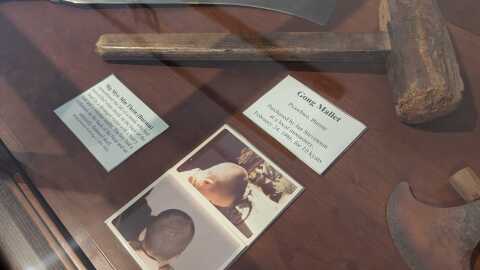Why is the additive, safely used since the 1930s, being questioned again?
-
It could be the next big advance in treating diseases.
-
Groundhog Day is a “cross-quarter day” on the celestial calendar. Cross quarter days are mid-way points between the Solstices and Equinoxes. These days are associated with many familiar holidays whose astronomical roots have largely been forgotten.
-
For nearly 60 years, this office has explored the nature of consciousness.
-
Partner company hopes to have the project up and running by the 2030s.
-
A panel of experts could determine if “pattern of misconduct” occurred.
-
An ongoing review of a former state crime lab analyst’s work uncovered the error.
-
Former Science Museum of Virginia scientist captures Greek family recipes in new cookbook.
-
Early in life, the protein Reelin helps assemble the brain. Later on, it appears to protect the organ from Alzheimer's and other threats to memory and thinking.
-
Head of Harrison Family Translational Research Center discusses advances in treatment.
-
The island's lost two-thirds of its land mass since 1850 and climate change is making the problem worse.
-
Entomologist Dr. Art Evans and VPM radio producer Steve Clark discuss bed bugs. Art offers a few tips on where to look for bed bugs when staying in a hotel.
-
Nintey percent of the world is righthanded. History and culture have not been kind to left handers. This is a somewhat rare occurrence among us humans. So, after all these years, if the right hand is preferred then why do we still have a bunch of leftys out there? What causes left handedness?
-
Entomologist Dr. Art Evans discusses with VPM radio producer Steve Clark, Art's latest project to survey the cicadas of Virginia. Twenty-five species and subspecies of annual and periodical cicadas are currently known to inhabit the Commonwealth.
-
Everyone who owns a dog loves to talk about how great it is to own their dog. Despite chewed up shoes, messes made on the carpet, and the seemingly never-ending costs of treats and accessories, dog owners love their furry best friends, but does that love mean anything for our health?
-
Dr. Art Evans and VPM radio producer Steve Clark talk about a photo of a black-and-yellow mud dauber sent in by WBY? listeners Donna and Sophia Burgess.
-
Communication is so important! Consider for a moment how valuable it is that we have the ability to communicate with one another. These exchange of thoughts have helped us build the world around us and will continue to be vital as we explore the rest of the universe.
-
Entomologist Dr. Art Evans and VPM radio producer Steve Clark discuss hummingbird moths and bumblebee moths. Art notes the occasional challenges of proper insect identification.
-
The James River’s overall health and restoration score is unchanged since the last State of the James Report was released two years ago.
-
We know more about the surface of the moon than Earth’s oceans and we know even less about the human brain, but a recently published study from CalTech is helping us put together a few pieces of the huge puzzle that is the brain. One of the biggest aspects of our lives is our memories. How does the brain keep memories?
-
Entomologist Dr. Art Evans and VPM radio producer Steve Clark discuss the remarkable hickory horned devil, a caterpillar that develops into the regal moth, one of North America’s largest insects.
























